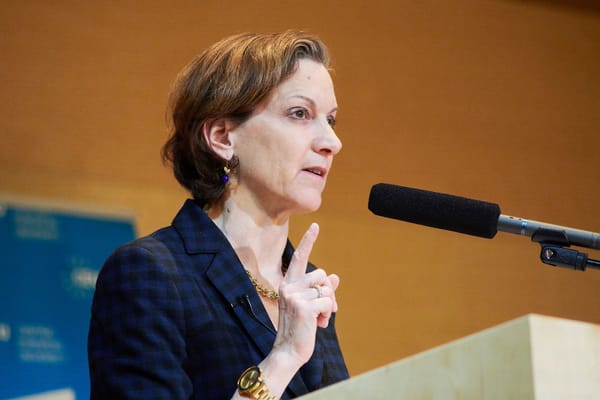The Atlantic last week hosted a conference titled “Disinformation and the Erosion of Democracy” at the University of Chicago, where I’m a student. Barack Obama, Amy Klobuchar, Anne Applebaum, Jeffrey Goldberg, Ben Smith, Brian Stelter, and other boldface names studded the program, alongside many lesser-known members of the prestige press. They would gather, as a news release put it, to explore “the organized spread of disinformation and strategies to respond to it.”
The Atlantic gabfest was billed as a space for rigorous dialogue, where the light of truth would scatter the darkness of disinformation. But the dialogue and criticism, it turned out, didn’t extend to the blue-check media’s own role in proliferating disinformation.
Even before the event got underway, I was skeptical. The conference struck me as one more chance for America’s corporate class to collect fat honorarium checks in exchange for addressing obedient students keen to join that class. My suspicions were soon confirmed. Given the opportunity to ask questions, most of my fellow students lobbed softballs at the speakers, in worshipful tones more befitting a royal audience than a university.
I wondered if I would be able to ask at least one critical query and receive an honest, meaningful response. As it happened, I got a chance to question Anne Applebaum, the Pulitzer-winning historian and Atlantic staff writer, following her session with Obama consigliere David Axelrod. For nearly an hour, Applebaum had effused about how important it is to fight disinformation. So I asked her if she thinks the media acted inappropriately in immediately dismissing the New York Post’s reporting on the Hunter Files as Russian disinformation—a claim we now know to be completely false.
“The Atlantic gabfest was billed as a space for rigorous dialogue, where the light of truth would scatter the darkness of disinformation.”
This wasn’t meant to be a gotcha. Yet Applebaum gave a stupefyingly arrogant (and borderline incoherent) answer: “My problem with Hunter Biden’s laptop,” she said, “is I think [it’s] totally irrelevant. I [mean], it’s not whether it’s disinformation, or I mean, I don’t think the—Hunter Biden’s business relationships have anything to do with who should be president of the United States. So, I didn’t—I don’t find it to be interesting. I mean, that would be my problem with that as a major news story.”
In 2020, two tech giants, Facebook and Twitter, had throttled the Post’s exposé on Hunter’s business dealings, which implicated one of two major-party presidential nominees, and the media had uncritically echoed the false assertion of 50 former spies that this reporting was a Russian information operation. And yet here was Applebaum, nearly two years later at an event dedicated to combatting disinformation, claiming she didn’t find any of this to be “interesting.”
Nonsense. Back when the Hunter Files were a live crisis for the Biden camp, Applebaum published a lengthy essay in The Atlantic that aimed to discredit the reporter who broke the laptop story. So if she doesn’t find the story interesting, why did she—along with the entirety of the corporate media apparatus—dedicate so much time and effort to trying to legitimate censorship of the Post’s reporting?
Applebaum’s haughtiness perfectly encapsulates why so many Americans are distrustful of the corporate outlets that claim to defend truth against “post-truth” disinformation. Figures like Applebaum don’t actually seem to care about disinformation. They just use the word as a tool to advance their own class and political interests.
Goldberg, The Atlantic’s editor-in-chief, put a cherry on top of all this when he lamented that his conference “has been the subject of disinformation campaigns.” Assuredly, he was referring to my question, as Applebaum’s spluttering answer went viral on social media, garnering nearly 3 million views. “Disinformation,” apparently, is when the self-appointed guardians of truth are exposed as partisan operators and handmaidens of high-tech censorship.
In the end, the conference’s message was unmistakable: College students, don’t ask critical, honest questions. Sit and obey. You all have made it to a top-10 university. Now you are expected to behave like us. Learn to show utter contempt for millions of your fellow citizens. Welcome to the elite, and good luck with those Yale Law applications.
